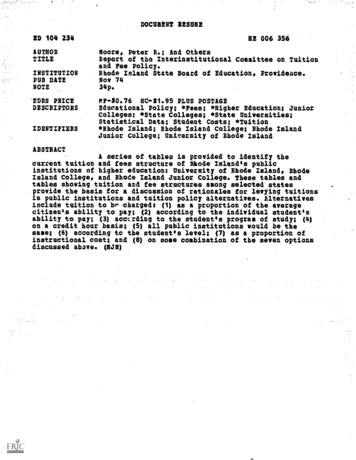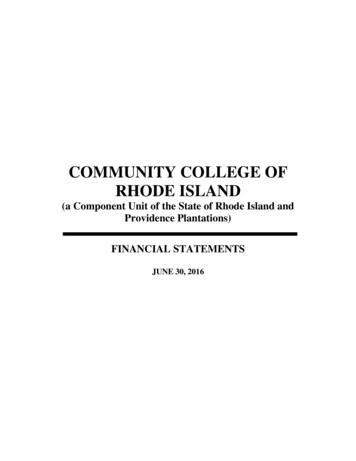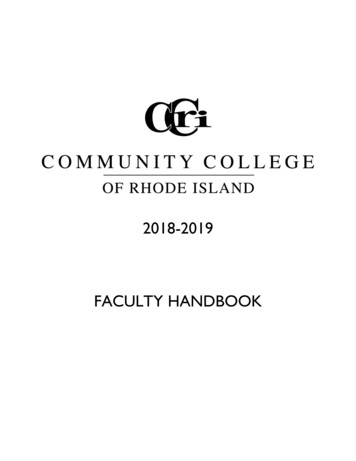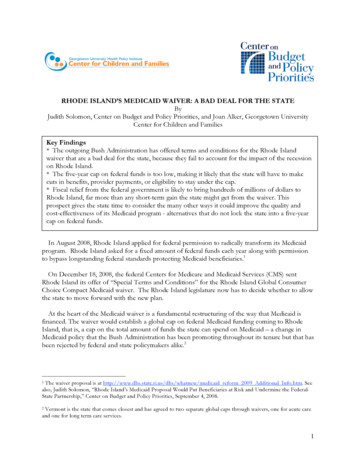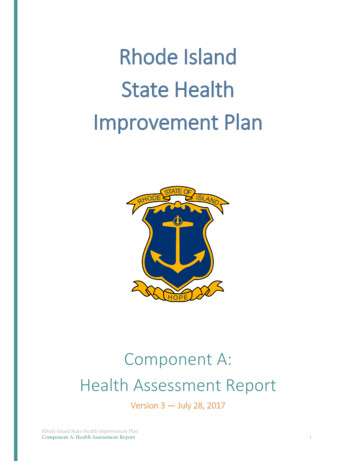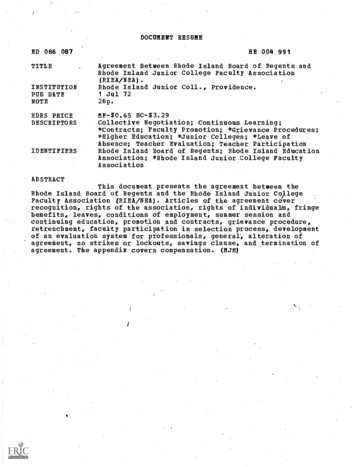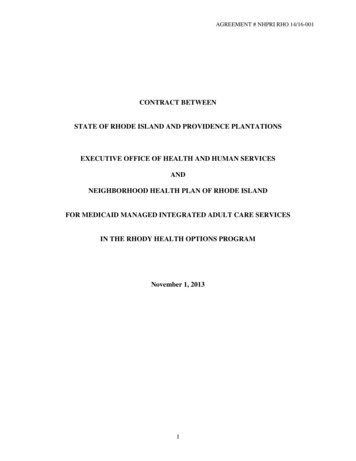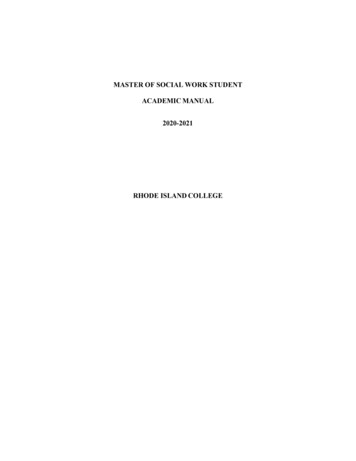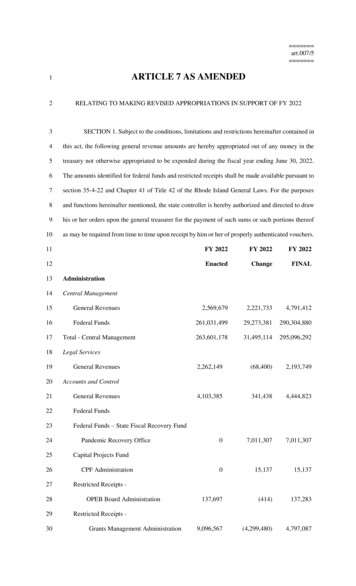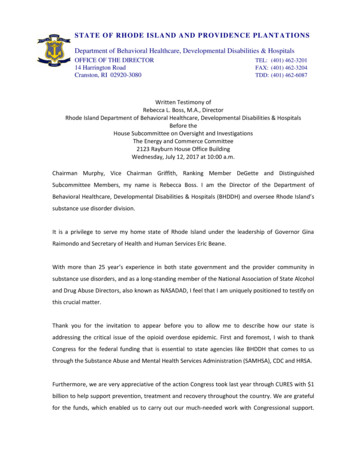
Transcription
STATE OF RHODE ISLAND AND PROVIDENCE PLANT ATIONSDepartment of Behavioral Healthcare, Developmental Disabilities & HospitalsOFFICE OF THE DIRECTOR14 Harrington RoadCranston, RI 02920-3080TEL: (401) 462-3201FAX: (401) 462-3204TDD: (401) 462-6087Written Testimony ofRebecca L. Boss, M.A., DirectorRhode Island Department of Behavioral Healthcare, Developmental Disabilities & HospitalsBefore theHouse Subcommittee on Oversight and InvestigationsThe Energy and Commerce Committee2123 Rayburn House Office BuildingWednesday, July 12, 2017 at 10:00 a.m.Chairman Murphy, Vice Chairman Griffith, Ranking Member DeGette and DistinguishedSubcommittee Members, my name is Rebecca Boss. I am the Director of the Department ofBehavioral Healthcare, Developmental Disabilities & Hospitals (BHDDH) and oversee Rhode Island’ssubstance use disorder division.It is a privilege to serve my home state of Rhode Island under the leadership of Governor GinaRaimondo and Secretary of Health and Human Services Eric Beane.With more than 25 year’s experience in both state government and the provider community insubstance use disorders, and as a long-standing member of the National Association of State Alcoholand Drug Abuse Directors, also known as NASADAD, I feel that I am uniquely positioned to testify onthis crucial matter.Thank you for the invitation to appear before you to allow me to describe how our state isaddressing the critical issue of the opioid overdose epidemic. First and foremost, I wish to thankCongress for the federal funding that is essential to state agencies like BHDDH that comes to usthrough the Substance Abuse and Mental Health Services Administration (SAMHSA), CDC and HRSA.Furthermore, we are very appreciative of the action Congress took last year through CURES with 1billion to help support prevention, treatment and recovery throughout the country. We are gratefulfor the funds, which enabled us to carry out our much-needed work with Congressional support.
Addiction and overdose are claiming lives, destroying families, and undermining the quality of lifeacross Rhode Island. For over a decade, opioid dependence and accidental drug overdose have beengrowing problems across the United States, and Rhode Island has been one of the hardest hit. In2013, Rhode Island had the highest rates of illicit drug use in the nation, as well as the highest rateof drug overdose in New England, and in 2015 had the fifth highest rate of overdose deaths in thenation.As the numbers indicate, this problem is not going away. Soon after her election in 2015, RIGovernor Gina Raimondo recognized the state did not have a comprehensive statewide strategy toevaluate, prevent, and successfully intervene to reverse the overdose trends. She knew that it wasnot enough to treat a single overdose; recovery support services needed to expand to embrace thefull scope and depth of treatment. Clearly a new strategy had to be implemented.In August 2015, Governor Raimondo signed an Executive Order establishing the Governor’sOverdose Prevention and Intervention Task Force naming the Directors of BHDDH and theDepartment of Health (DOH) as Co-Chairs. The Task Force included stakeholders and experts in fieldsranging from public health and law enforcement to healthcare, community-based support services,insurance, academia, business, government and more. Also included were family members of thosewho lost loved ones, and have added an invaluable perspective that we in government and theprivate sector sometimes miss.The Task Force created a Strategic Plan for Addiction and Overdose and recommended numerousstrategies within four areas: prevention, rescue, treatment and recovery. The data-driven plan wascreated and soon after, with the help of Brown University a website was created(www.preventoverdoseri.org) where all efforts are tracked in a public and transparent fashion.The distinguishing factor of the multi-disciplinary Task Force was that the members brought the Planback to the sectors they represented. For instance, the Medicaid Director worked with her team tocut red tape that was identified and work with the insurers. The community providers, with theirboots on the ground, were nimble enough to put plans in action after our meetings.Each of the four areas has moved forward with numerous initiatives:2 Page
PreventionSafer Prescribing: To achieve safer opioid prescribing, it is important to weigh the benefits ofmedication access for patients living with acute and chronic pain with those of the risks of diversion,addiction, overdose, and premature death. Unsafe combinations of prescribed medications arelinked to addiction and many overdoses are preventable. To support these efforts, the Rhode IslandLegislature passed the following bills: (2016-H8224A, S2823Aaa): Sets out limits for most initialopioid prescriptions. Requires pharmacies to upload dispensing data within 24 hours. (S2822A):Allows patients to synchronize certain drug refills for chronic conditions by requesting a limitedsupply (less than 30 days), with pro-rata cost sharing applied by the insurerThe key strategy to reduce dangerous prescribing is to use the Prescription Drug MonitoringProgram (PDMP) and system-level efforts to reduce co-prescription of benzodiazepines with opioids(for pain or opioid use disorder). Before DOH launched its Prescription Drug Monitoring ProgramEnrollment Enforcement Plan in 2016, more than 30 percent of Rhode Island prescribers had failedto enroll in the PDMP, and fewer than 40 percent were using it. As of July 2016, legislation hadpassed that all such practitioners shall be automatically registered with the Prescription DrugMonitoring Program maintained by the Department of Health. As of today, 100 percent ofpractitioners are enrolled. To support these efforts, the Rhode Island Legislature passed thefollowing bills: (2016-H7847, S2897): Allows the Prescription Drug Monitoring Program to beelectronically connected to electronic medical records systems. (H7849, S2874): Adds Schedule Vprescriptions to the Prescription Drug Monitoring Program. (H8326, S2946A): Requires DOH to lookfor federal funding opportunities to improve the PDMP, such as by adding additional analyticalfunctions and incorporating data from similar programs in other states.Additionally, DOH Director, Dr. Alexander-Scott co-led a successful national petition drive calling onthe FDA to require “black box” labels on opioids and benzodiazepines warning that concurrent useof these medications increases the risk of fatal overdose.Reducing the Supply of Prescribed Opiates (Rx): Rhode Island has developed regulations that limitmost opioid dosing for acute pain management to a contained period of time (with exceptions forspecifically-determined patients) and supports existing hospital policy to restrict opioid prescriptionsfrom emergency rooms to three days or less.3 Page
The promotion of non-opioid therapies for chronic pain, such as chiropractic services, massagetherapy, physical therapy, and acupuncture as important alternatives to opioid pain relief is anothersuccessful effort in Rhode Island.Access to comprehensive health care coverage, includingMedicaid, is a crucial component of these non-opioid alternatives.Reducing Demand (Illicit): We cannot arrest our way out of this crisis, but we must build onpartnerships with community organizations and law enforcement to reduce demand for heroin andother illicit drugs. Deaths associated with illicit drug use and fentanyl have increased exponentiallyin recent years. To address the illicit drug crisis, the Rhode Island Department of Health is workingwith the Rhode Island State Fusion Center and participating in the New England High Intensity DrugTrafficking Area (NEHIDTA) multi-state Heroin Response Strategy. This program, funded through theOffice of National Drug Control Policy, currently maintains a 20-state partnership to address heroinand opioid abuse and trafficking. In fact, Rhode Island has designated a Heroin Response StrategyDrug Intelligence Officer and Public Health Analyst who are positioned at the Rhode Island StateFusion Center.There is no current data on all fentanyl drug seizures from RI law enforcement since manyinvestigations are ongoing. However, the NFLIS data has shown steady fentanyl seizures in powderform with sporadic counterfeit pill seizures (most recently pills containing furanyl fentanyl). Heroinseizures have declined.The supply chain enters RI via sources in NY and MA as well as from China via US mail and commoncarrier services (UPS) etc. Cartels are not prominent in RI but their use of secondary drug traffickingorganizations to ship the product is the most common source of transport. We remain concernedabout the strong potential for the production of counterfeit A-215, M-30 and V-48/12 pills in ourarea.Hospital Testing for Fentanyl: Some hospital systems are testing for fentanyl, but we do not yetknow the frequency of testing or how many tests are returning positive for fentanyl. DOH is hopingto develop a data feed to include fentanyl test results.With regards to fentanyl testing in the Emergency Departments, there is some preliminary datafrom one of the largest hospital systems. Between March 1st and May 31st, just under 3,6004 Page
toxicology screens were conducted, of which 11.6% were positive for fentanyl. About 40% ofdischarges coded as overdose (and which a toxicology screen was conducted) were positive forfentanyl.In February, Rhode Island started testing all inductees in the Opiate Treatment Program (OTP)system (13 locations throughout RI) and have met regularly with the OTP MD’s to analyze findings.Initial results indicate that a large percentage of individuals being admitted to treatment are testingpositive for either heroin or fentanyl, or fentanyl alone.MODE Team: Rhode Island has implemented a Multidisciplinary Review of Drug Overdose DeathEvaluation (MODE) Team which combines strategies of “rapid response” with “communityintervention.” The Team is modeled after the multidisciplinary review processes for child deaths.The purpose of the MODE Team is to gain insight into emerging overdose trends, identify gaps in oropportunities for policy development and prevention programming and inform the distribution ofmini-grants to Rhode Island communities for prevention efforts. The MODE Team is comprised ofindividuals from varying agencies and organizations, including the Rhode Island Department ofBehavioral Healthcare, Developmental Disabilities, and Hospitals (BHDDH); Rhode IslandDepartment of Health (RIDOH); Boston Medical Center’s Injury Prevention Center; Rhode IslandDepartment of Corrections (RIDOC); and Brown University. Data sources come from RIDOH (MedicalExaminer reports, Prescription Drug Monitoring Program (PDMP)), BHDDH (substance abuse andmental health treatment episodes), and RIDOC (incarceration history and medical records fromincarceration). The MODE Team has met three times quarterly to review this data on 11 cases.Twenty-five MODE Team recommendations have been developed, with nine community-based drugoverdose prevention mini-grants distributed.Surveillance, Response, and Interventions (SRI): This workgroup made up of staff from DOH andBHDDH review overdose information on a weekly basis. When overdoses exceed a certain threshold,alerts are issued to the community, law enforcement, and health providers.RescueNaloxone as Standard of Care: Naloxone saves lives by reversing the severe respiratory depressioncaused by opioids. Its use by laypeople trained to identify and respond to overdose has been linked5 Page
to reductions in overdose death rates. People who use opioids are at greatest risk of overdose, andare motivated to protect themselves and others around them to save a life with naloxone. Lawenforcement being equipped with naloxone is critical in the fight against opioid overdoses. In fact, inRhode Island two police departments (East Providence and North Providence) have offered topurchase naloxone for those departments who may not have the funds to purchase it themselves.Further, Rhode Island has promulgated regulations requiring all inpatient substance use disorderproviders to offer naloxone to at-risk clients, Emergency Departments are dispensing naloxone toindividuals who have overdosed, peers distribute on the street, and inmates with substance usedisorders are given naloxone upon release. Fortunately, Medicaid funds pay for Naloxone andallows BHDDH to use other federal funds for additional prevention and intervention activities.Rhode Island’s DOH Director, Dr. Alexander-Scott sent a letter to Rhode Island prescribersencouraging the co-prescription of naloxone and a letter to Rhode Island pharmacists encouragingthem to stock naloxone. To support these efforts, the Rhode Island Legislature passed the followingbill: (2016-H7710A, S2460Aaa): Requires all insurers to cover naloxone and related devices, includingin cases where the medication is intended for patients other than the insured.Naloxone in the Community: Rhode Island State Police invested 40,000 in Google settlement fundsin February 2016 to distribute more than 1,000 naloxone kits to law enforcement agencies. BHDDHhas secured 40,000 from the Substance Abuse Prevention and Treatment block grant to purchase1,000 units of naloxone in 2016. Kits were distributed at the Department of Corrections and throughtargeted street outreach by peer recovery coaches.This effort will be sustainable for threeadditional years.Good Samaritan Law: "The Good Samaritan Overdose Prevention Act of 2016" was stronglyadvocated by the Task Force, after the previous Good Samaritan law had expired. The new law alsoexpanded immunity to people at risk of violating probation or parole and protects from liabilitythose who use life-saving medical treatments such as naloxone that can prevent an overdose. Tosupport these efforts, the Rhode Island Legislature passed the following bill: (2016-H7003)(S-2002)No liability to any person who administers an opioid antagonist to another person to prevent a drugoverdose and provides immunity for violations of probation and/or parole for those persons who ingood faith, seek medical assistance for a person experiencing a drug overdose.Treatment6 Page
Medication Assisted Treatment:Evidence indicates that medication-assisted treatment(methadone, buprenorphine or depotnaltrexone* injection) has profound effects on people with anopioid use disorder. It reduces their risk of death, relapse, chance of going to prison, and greatlyimproves their quality of life.Rhode Island supports a model of shared decision making between the individual and their provider.We support the use of FDA-approved medications for the treatment of opioid use disorder includingmethadone, buprenorphine products, and injectable naltrexone, always in the context of recoverysupport services. These supports vary based on patient need, but include drug and alcoholcounseling, screening and treatment of co-occurring mental and physical health issues, checking ofthe state prescription drug monitoring database, toxicology screening, individual and grouptherapies, peer support services, vocational and educational assistance. These supports mustinclude the development of a treatment agreement with every person receiving care. GovernorRaimondo, RIDOH, and BHDDH, along with expert advisors to the Task Force began working withprimary care practice leaders across the state to overcome barriers to expanding buprenorphineprescribing among primary care providers.Rhode Island has developed the Centers of Excellence for the Treatment of Opioid Use Disorderwhich are being established throughout the state. This model provides a means of rapid access totreatment for opioid use disorder, provides all of the above-mentioned services and workscollaboratively with community providers of ongoing treatment for the opioid use disorder oncestabilized in the Center of Excellence. This model also provides additional support to communityproviders—be they physicians or other allied providers, or community treatment programs that maynot be equipped to assist a person who experiences relapse to opioid use by re-admitting theperson to the Center for any additional stabilization needed. These Centers also serve to assist withthe workforce development needs of our state in that these centers provide practical educationalexperiences in opioid use disorder treatment to community providers and trainees alike. Centers ofExcellence are funded through private third party insurers as well as Medicaid. With Medicaidexpansion, many more people are able to access Medication Assisted Treatment for opioidaddiction.Rhode Island offers medication-assisted treatment through the Department of Corrections. The7 Page
Governor proposed 2.5 million in the FY17 budget for medication-assisted treatment in the stateprisons and the General Assembly approved 2 million in the final budget. The Governor requestedrepeat-funding in her FY18 budget. Individuals who are awaiting trial are no longer withdrawn fromMAT, and those who are opioid dependent and not in treatment are able to be inducted onmedication as appropriate. Incarcerated individuals with histories of opioid use disorder are at asignificantly increased risk of overdose upon release, so these individuals are also being offeredinduction on MAT. The Department of Corrections has worked closely with the Rhode IslandMedicaid Office to ensure that these individuals are connected to coverage so that there is nottreatment disruption upon release.Centers of Excellence: As described above, the Centers of Excellence for the Treatment of OpioidUse Disorders was created and provides comprehensive evaluation, including mental healthevaluation and treatment or referral, induction and stabilization services, as well as support toproviders in the community. It is envisioned that such Centers would refer stabilized patients toother providers and receive back patients if they destabilize and require more intensive services.Rhode Island’s first Center of Excellence opened in November 2016 at CODAC BehavioralHealthcare. CODAC has six sites with a COE at each site; a seventh will open soon in the statehospital known as the Eleanor Slater Hospital System. Additionally, two community providers areopening new COEs this month.Waiver Training: Rhode Island has sought to address the issues of access to care and workforcedevelopment by building a program of physician and practitioner Drug Abuse Treatment Act of 2000(DATA 2000) trainings which are necessary to obtain the waiver to prescribe buprenorphine toindividuals with opioid use disorder from office-based practice. These trainings also offer educationon the epidemiology of opioid use disorder in the United States, appropriate assessment andtreatment of opioid use disorder, an overview of all FDA-approved medication assisted treatmentand evidence-based psychosocial interventions, confidentiality issues related to 42 CFR Part 2, andan overview of special populations that may be affected by opioid use disorder. As such, the courseis an excellent overview of current approaches to management of substance use disorders. We havetrained over 300 practitioners since January of 2016 and we have established a system whereinstitutions can request trainings as needed. This dovetails well with our practical experienceavailable in Centers of Excellence and which we hope will encourage prescribers to engage in officebased treatment of opioid use disorder.8 Page
Rhode Island is leading the way with the training of medical students, the first of its kind in thecountry. The 2018 Class of the Warren Alpert Medical School of Brown University, which willgraduate next May, will be the first class to participate in a new program to complete the trainingnecessary to qualify for a Drug Abuse Treatment Act of 2000 (DATA 2000) waiver prior tograduation. The waiver is necessary to prescribe FDA-approved medications for the treatment ofopioid use disorders. Once the new graduates receive their full medical license and DEAregistration, they can apply for the DATA 2000 waiver.Emergency Department Standards: Leadership from hospitals and emergency departmentsthroughout Rhode Island joined Governor Raimondo's Overdose Prevention and Intervention TaskForce. They will release a first-in-the-nation set of statewide guidelines to save lives by ensuringconsistent, comprehensive care for opioid-use disorder in emergency and hospital settings. Releasedin March 2017, it established a common foundation for treating opioid-use disorder and overdose inRhode Island hospitals and emergency departments, the standards establish a three-level system ofcategorization that defines each hospital and emergency department's current capacity to treatopioid-use disorder. All emergency departments and hospitals in Rhode Island will be required tomeet the criteria for Level 3 facilities. As a facility's capacity to treat opioid-use disorder develops,that facility can apply for a higher designation.Recovery:Expand Recovery Supports: The growing need and capacity for peer recovery services mirrors thepace of the epidemic. Successful recovery nurtures the individual’s health, home, community andpurpose. New opportunities are envisioned that support peer recovery services and medicationassisted recovery. Medicaid coverage for treatment of substance use disorders and parity hasallowed Rhode Island to maximize block grant fund and state general revenues to fund theseimportant supports as well as prevention activities.Recovery Coaches: It is important to cultivate a recovery coach pipeline, with a plan to double thenumber of recovery coaches for statewide and extended coverage, supporting in-prison recovery9 Page
coaching and certification, and ensuring proper support and supervision of recovery coaches at thisscale. Every effort is being made to expand and create consistency in reimbursement for delivery ofcertified peer recovery coach services. Since RI developed a certification process in 2014, 98 peerrecovery coaches have been certified in RI, nearly double in 2016 than in 2015. A related aspect ofthis strategy is to standardize help-seeking and recovery supports through standardization ofemployee assistance programs (EAP) for the workforce and by mandating that all drug treatmentprograms develop recovery planning (including training programs and referrals, establishcertification for recovery housing, and support case management to help people access resources)or coordinate such supports with an outside entity.DOH has a contract with Anchor Recovery through 2019 to provide peer recovery coaches toinmates upon release from the Department of Corrections and through targeted street outreach tostate hotspots.Recovery Coaches in Emergency Departments (AnchorED): In May of 2014, Rhode Island started apilot program using recovery coaches to respond to overdose survivors while they were receivingtreatment in hospital Emergency Departments. On-call coaches respond to overdose survivors andoffer support, referrals, resources, family support and training on naloxone. This success of this pilotproject supported its expansion to be offered statewide twenty-four hours per day, seven days perweek. These coaches have had great success at engaging clients with an 85% follow up rate withtreatment and/or recovery support services. This service has provided the state with a wealth ofinformation on the experience of individuals with the healthcare system as well as the addictiontreatment system. While engaging with recovery coaches at a crucial point in their addiction, manyindividuals make the decision that they are ready for treatment – seeing the hope of recoverythrough shared experience and recognizing their desperate state makes people ready for change.The number of contacts that the Peers have made in the ED has been steadily increasing fromaround 85 contacts in the first month to 165 contacts in the most recent month. The majority ofpatients seen in this program (67%) are not currently receiving treatment for substance usedisorders (SUD), but more than 85% of them agree to get a referral to SUD treatment.Anchor MORE: The success of AnchorED spurned the development of AnchorMORE, recognizingthat successful consumer engagement does not have to wait for an individual to show up at and EDwith an overdose. The Anchor MORE is a community outreach program, placing recovery coaches10 P a g e
on the streets to connect with and engage individuals. Anchor MORE currently dispatches theseteams of recovery coaches to areas in which individuals are using substances in public places.Anchor MORE teams are also proactively dispatched to certain areas in the state by looking atoverdose data and emergency services pick-up data. Both programs connect individuals withrecovery coaches - trained peers with lived experience of addiction. Recovery coaches stay activelyengaged with individuals after an encounter and connect them to treatment and recovery supportservices, including integrated health home teams, homeless assistance programs, employmentassistance programs, primary care, and case management services, once the individual iscomfortable.Recovery Houses: Safe, drug-free living environments are crucial to support recovery. Rhode Islandhas identified a funding source to begin the certification process for a network of recovery housesacross the state. Legislation passed that requires recovery houses to meet a set of standards toreceive state certification. The National Alliance for Recovery Residences (NARR) will be tasked withcertifying recovery houses and will receive verified training to become a certifying entity. Recoveryhousing will include on-site staff and resources in addition to housing. Rhode Island Communities forAddiction Recovery Efforts (RICARES) will be tasked with stakeholder oversight. To support theseefforts, the Rhode Island Legislature passed the following bill: (2016-H8056A, S2579B): AuthorizesBHDDH to develop a process to certify recovery housing facilities for residential substance abusetreatment.Discharge and Recovery Plan: Through the work done by the Task Force, state health agenciesdeveloped a model discharge and recovery plan to promote recovery services for patients withsubstance use disorder. Known as the Perry and Goldner Bill, the legislation is designed to improveemergency room treatment for those with substance use disorders and ensures patients receive adischarge and recovery plan. To support these efforts, the Rhode Island Legislature passed thefollowing bill: (2016-H7616A, S2356Aaa: The Alexander Perry & Brandon Goldner Act): Requirescomprehensive discharge planning for patients with substance use disorders and requires insurers tocover expanded medication-assisted treatment.Rhode Island’s Future Plans: Today, Governor Gina Raimondo is issuing an Executive Orderdeclaring that the alarming rate of deaths caused by opioid overdose constitutes a public healthcrisis. The Executive Order outlines new initiatives in the four areas recommended in the TaskForce’s Strategic Plan: Prevention, Rescue, Treatment and Recovery. Included in the Order are11 P a g e
educational components, the promotion of existing systems, and the expansion of partnerships. TheGovernor also incorporated a coordinated public outreach campaign into the Order to engageparents and youth to prevent opioid abuse through the establishment of a Parental Task Force. ThisTask Force will collaborate with schools to expand access to prevention programming for high-riskyouth and the expansion of family support groups throughout the state. The Executive Orderasserts that all state agencies, with coordination and support from the Task Force, shall take allnecessary actions to reduce opioid overdose deaths. The Departments of Health and BehavioralHealthcare, Developmental Disabilities, and Hospitals will ensure implementation of the ronasemi-annualbasis.Executive Order 17-07 issued on July 12, 2017.Recommendations: I humbly submit a few recommendations – Any federal initiatives include the involvement of the state agencies. Between the expertiseand authority our staffs have within the substance use disorder system, our agencies canhelp to chart the right course. The importance of the Substance Abuse Prevention and Treatment Block Grant cannot beunderstated. It is a critical component in our efforts to engage our communities in primaryprevention. We hope the strong support you have shown continues. As Medicaid has laidthe foundation for treatment coverage, the block grant has been critical in providingcoverage for recovery support services and prevention efforts. Targeted funds to address the many issues I have discussed today would be helpful.Congress has shown generous support to substance use disorder agencies and we certainlyhope there is consideration for continued support. Treatment for substance use disorders leads to recovery. Access to the treatment has beenadvanced by Medicaid expansion. Continuing to support funding for Medicaid expansion tosingle adults with low incomes is essential to helping more people recover from substanceuse disorders. Many individuals living with substance use disorders do not have access to transportation.Permitting mobile methadone or buprenorphine provisions would eliminate that barrier andmake treatment more accessible. Workforce development in the field of substance use disorders is crucial with a standardizedcertification program to license workers across all states. If this were coupled with a loanforgiveness program, the workforce could grow to the numbers needed.12 P a g e
With elder opioid addiction on the rise, parity for Medicare clients would be welcomed byall. Repealing the Institution for Mental Disease (IMD) exclusion would
With more than 25 year's experience in both state government and the provider community in substance use disorders, and as a long-standing member of the National Association of State Alcohol . Enrollment Enforcement Plan in 2016, more than 30 percent of Rhode Island prescribers had failed . Rhode Island's DOH Director, Dr. Alexander .
